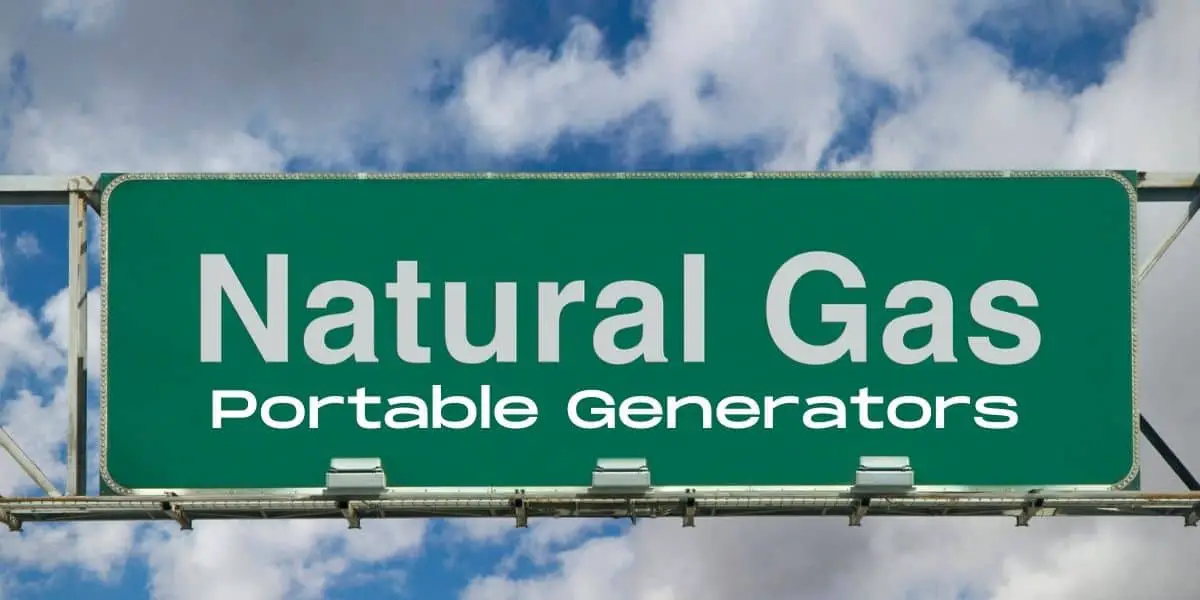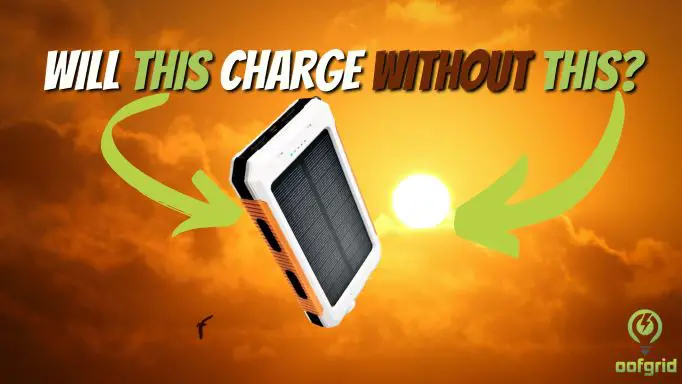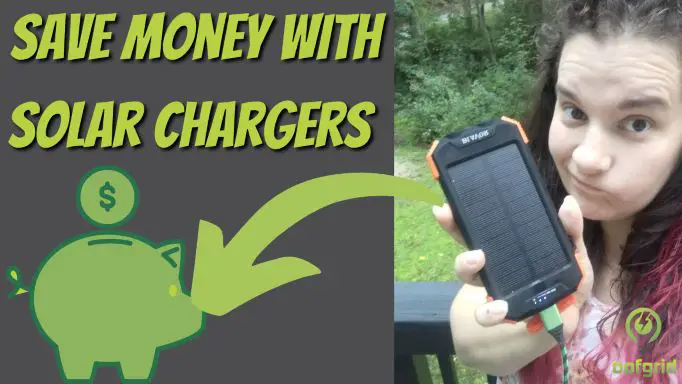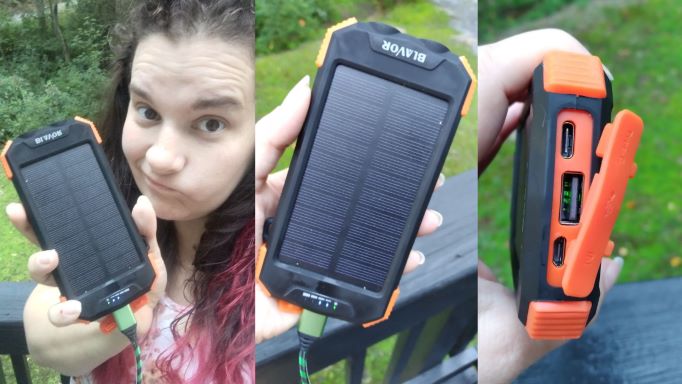If you are done with the noise, smell, and hassle of a typical gasoline or diesel generator, a natural gas portable generator might be just the solution for you! After all, not all fuels are equal. You may not have been aware that portable generators can run on natural gas, but in fact, natural gas is an increasingly popular alternative to LPG and some generators can run on both.
In this handy guide to portable natural gas generators, we will give you the rundown on using natural gas as an alternative fuel for running your generator.
We hope you’ll see
- just how convenient natural gas is,
- how easy it is to hook natural gas up to a portable generator…
- …and the type of fuel efficiency and running costs you can expect.
Also, we will take a look at 3 of the best portable natural gas generators on the market. Read on and equip yourself with portable generators that will give you excellent service whether they are used for work or play.
Contents
Using natural gas with your portable generator
Portable generators are a basic for so many aspects of day to day life. Being able to move your generator around is so much more convenient and portable generators really get the power to exactly where you need it on hand. It’s no surprise that portable generators are the ideal power solution for:
- Emergencies or back up power
- Workshops and building sites
- Camping
- Events and entertainment
But when it comes down to the fuel choice for your portable generator, you may be looking for alternatives to the standard gasoline and diesel. Sure, gasoline is easy to get hold of, but gas can be hazardous to store on your property and does not give the cleanest burn.
Diesel exhaust carries a lingering odor and the quality of the power generated is not always great for your sensitive electronics.
It’s therefore not surprising that many people are looking at whether natural gas would make a cost-effective and cleaner alternative.
What is a natural gas generator?
These are generators that can use natural gas as fuel for generating electricity. Natural gas generators aren’t a niche product. They are responsible for the largest share of the overall electricity generation in the US!
Because piped natural gas is distributed to properties via the energy grid, many properties have a large backup generator that is connected to the mains gas supply in case of outages.
Portable natural gas generators are designed to run specifically on natural gas. The engine and alternators of these generators are structurally identical to those of gasoline generators.
Other units are dual-fuel or tri-fuel, able to run on propane and gasoline as well. Natural gas generators can also be made by converting a regular gasoline generator with a conversion kit (more on that below).
What is natural gas?
As its name suggests, natural gas is a naturally occurring gaseous fossil fuel that is drawn from underground deposits that have formed between rocks deep in the earth’s crust alongside coal and oil.
Natural gas was initially obtained as a by-product of oil production and coal mining, but contemporary production includes Liquefied Natural Gas (LNG) which can be efficiently transported and stored.
Compared to other hydrocarbon fuels, it burns cleanly and efficiently and is used as a fuel for a broad range of domestic, industrial, and transportation purposes.
Natural gas is a significant fuel of electricity production, and is used in power stations to generate heat and electricity, or heat water to drive steam turbines.
Natural gas power is often used alongside renewable energy sources such as wind or solar for large-scale power production for the electrical grid.
It is also the type of gas that many households across the developed world have piped into homes to use for stoves, furnaces, and boilers. Rural households and many developing countries use natural gas in the form of Compressed Natural Gas (CNG).
You may be wondering if LPG is the same as natural gas?
Though both are bottled gases, natural gas is not the same as LPG, they are chemically distinct. Natural gas is predominantly methane, along with other alkanes, carbon dioxide, and some helium. Liquefied Petroleum Gas (LPG) is a mixture of butane and propane, that is refined from petroleum.
5 key benefits of using natural gas for your portable generator
5. Natural gas is a remarkably clean-burning fuel choice
We all know that fossil fuels have a bad rap, but natural gas has one of the best profiles for CO2 emissions, ahead of propane, gasoline, and diesel. You can be confident that while you use your electricity, your natural gas portable generator will emit significantly less nitrogen and sulfur-based pollution while it burns, with great fuel efficiency as we break down below.
4. Burning natural gas is a low odor
The smell of the exhaust fumes of a gasoline generator can really affect where you choose to locate it, especially if it is used for recreation. You will certainly notice the difference in air quality when using natural gas rather than gasoline or diesel with your generator.
3. Natural gas is cheaper than gasoline AND diesel
When running a portable generator, time definitely equals money. So you will be pleased to know that the price of natural gas has fallen relative to gasoline and diesel in recent years. It is about a tenth of the cost of diesel and at least $1.50 cheaper per gallon equivalent than gasoline.
2.Natural gas is a safe fuel selection
With natural gas, you do not have to worry about spills and their cleanup. Methane is, in fact, odorless (that eggy gas smell has to be added so you can tell that there are leaks), light, and will dissipate quickly. It is also less flammable than propane.
1. Storage is a cinch
If you find keeping a jerry can of gasoline on your property a hair-raising experience, you will feel much more comfortable handling and storing a cylinder of natural gas.
Your natural gas cylinders can be stored just like LPG and can be kept on hand indefinitely. If you hook your portable generator up to a mains gas valve on your property (the one you use for your gas barbecue), there is no storage needed at all, making natural gas the most convenient choice.
Natural gas versus LPG for your portable generator
Methane is an incredibly energy-dense molecule that consumes oxygen efficiently at a 10 to 1 ratio to yield up to 38.7 Megajoules per cubic meter of gas. But LPG is the more calorific fuel, releasing 96.2 Megajoules per cubic meter of fuel.
LPG is also denser and, unlike natural gas, is heavier than air meaning that a lower volume will be required for a far greater output of electricity from your generator.
However, the convenience and accessibility of mains natural gas cannot be overlooked especially in emergencies where fuel deliveries may be delayed or suspended for a protracted period.
Connecting natural gas to your generator
Like regular liquid fuel generators, gasoline portable generators can be either pull start or remote start with a decent spark plug as the natural gas is more difficult to ignite. The generator will carry a natural gas valve to which you connect your hose.
Key pointers for starting your natural gas generator:
We recommend watching this excellent video that breaks down all the steps needed for getting a portable gas generator up and running:
- Before starting up you can add a good quality synthetic motor oil to lubricate the engine valves.
- Ensure that your gas hose has the correct connectors on it and a good seal to the gas inlet to prevent leaks. Some users use a layer of plumbers tape on the male and female connectors to improve the sealing.
- You can connect the gas hose to your outdoor mains gas valve, just like you would with your barbecue line.
- The natural gas should be delivered at a pressure of 0.5 to 1 PSI.
- A pull start may be harder to ignite but once you get going most natural gas generators have a combustion gas flow adjust to allow you to increase/decrease the flow of gas with a screwdriver.
- It is well worth keeping a multimeter on hand to verify the output voltage and frequency of the generator before you hook it up to your sensitive equipment and appliances, as the engine can take a while to become adequately filled with gas.
Disconnecting mains gas from your portable generator
If you are running a generator with mains natural gas from your property shut off the gas main on your property to shut the generator down. This will ensure that the hose that you have connected to your gas main is emptied and the generator consumes all the natural gas in it so that it is completely empty.
Taking care of a natural gas portable generator
When you use natural gas with your generator you are running a dry fuel engine and this can affect the engine valves and valve seats over time. This is called valve recession.
If the portable generator has been specifically designed for this purpose, the valves will be reinforced to accommodate these effects, or special lubricants and motor oils can be used as mentioned above.
This excellent video from The Repair Geek outlines all the steps involved in connecting your portable generator to mains natural gas and disconnecting it safely.
Can you convert a generator to run on natural gas?
Even if you are pressed, you can’t hook up natural gas to a gasoline portable generator. It just isn’t set up for burning fuel in gaseous form.
However, it is possible to convert a generator that runs on liquid fuel to run on natural gas by using a natural gas carburetor. This ingenious piece of engineering is specifically designed to inject the correct quantity of pressurized gas into the cylinders of the generator engine rather than gasoline.
A generator natural gas/LPG conversion kit that is compatible with your brand of portable generator can be purchased and fitted to the unit. This will make your gasoline generator a dual-fuel portable generator and you should be able to switch back and forth between the fuels.
A great example is the Tri-Fuel Generator Conversion Kit for Honda generators by Hutch Mountain. This 5-pound full-flow adapter allows you to use either natural gas or propane with a regular gasoline generator. It is delivered almost fully pre-assembled with clear instructions on how to fit it to a Honda generator and the gas hose is supplied.
- ⚡ WITH 3 FUEL OPTIONS (Propane, Natural Gas or Gasoline), you will have power when you need it most.
- ⚡ WITH SO MANY NATURAL DISASTERS (and viruses) in this world, you can have peace of mind that your generator will do the job and with the power you need.
- ⚡ NO MORE SMELLY GASOLINE or gummed up carburetors. You can have peace of mind knowing you are using green alternative fuels.
- ⚡ENDLESS SHELF-LIFE with clean propane or natural gas fuel. You will love running propane & be in control when you need the power!
- Converts many models to natural Gas.
Taking a closer look at some a portable natural gas generator
If a natural gas generator sounds like the ideal solution for your household’s power needs, you will be pleased to know that there are high-quality portable models.
Portable natural gas generators are not widespread due to the prevalence of gasoline or propane generators, so you will need to do your research to find a generator manufacturer that has a natural gas model on the market when you are ready to buy.
Generators like the model below provide all the benefits and convenience of using mains or bottled natural gas.
EXAMPLE: Powerland Hybrid Tri-fuel Portable Generator
KEY FEATURES
Starting Watts: 4400
Running Watts: 3500
Engine specs: Overhead Valve Engine (OHV) – 4 stroke – single cylinder
Output voltage: 120 or 240 Volts
Frequency: 60 Hz
Fuel: Natural gas, LPG, gasoline
Noise: 75dB at 22 feet (7 meters)
Dimensions: 30.2 by 22.5 by 24.2 inches
Weight: 136 kilograms
Powerland is a brand that has become well known for producing quality natural gas generators and this tri-fuel model delivers exceptionally good value as one of the best natural gas generators under $1000.
In addition to running natural gas, the generator can switch to using propane or gasoline, making it an excellent backup power option.
This advanced model has a running wattage of 4400 but other multi-fuel models in the Powerland range can be over 10,000 watts meaning a whole house worth of appliances can be served by emergency power generated from the mains gas supply.
It features a four-stroke LPG/NG/Gas combustion engine. The OHV motor is air-cooled and also has a low-oil shutoff. On the outside of the generator a range of hard-wearing AC outlets that are suitable for home and business including:
- 120 Volt / 20 Amp AC outlet
- 120 Volt / 30 Amp AC outlet
- 120 Volt / 240 Volt / 30 Amp AC outlet
- 120 Volt / 240 Volt / 50 Amp AC outlet
The generator is securely housed in a rugged frame with rugged wheels that should be able to stand up to years of heavy-duty use.
Pros of the Powerland Hybrid Tri-fuel Portable Generator
- This generator has a reputable performance with natural gas but also gives you the flexibility of using alternative fuels.
- Powerland generators have automatic voltage regulation meaning that computers can be used safely via the appropriate outlet.
Cons of the Powerland Hybrid Tri-fuel Portable Generator
- The pull start when using can be hard work as natural gas has a higher ignition temperature than the other fuels that this generator uses.
- If you have difficulties igniting natural gas, the spark plug of this generator may need to be replaced.
F.A.Q
Can a propane generator run on mains gas?
No. Propane and natural gas are different fuels and have distinct physical properties and require different pressurization. This means that the hole that the LPG passes through is sized differently from the opening required for natural gas.
Propane delivery is at a pressure that is at least 1.5 times that of natural gas. The BTU of propane is also higher per cubic foot. It is these factors that determine the orifice size in the propane generator.
The orifice size for natural gas is double that of a propane generator. However, a carburetor converter can be used to adapt a propane portable generator to run on natural gas.
What type of hose do I need to connect natural gas to a generator?
You should use a quick-connect hose that is of adequate diameter and able to conduct pressurized gas. Quick connect connectors are designed to be straightforward to competently connect with minimal use of tools.
A great example is this natural gas hose by Only Fire which is designed for generators and gas barbecues. It features a rugged and robust 12 foot reinforced rubber hose with a diameter of ¾ inch that is capped with high-quality brass connectors.
The ¾ inch connectors include a male quick-connect plug and male pipe swivel as well as a female pipe thread.
What maintenance is needed for a natural gas generator?
If you treat your generator well it will be good for you. Routine maintenance is prudent if you are not expecting to rely on it regularly. Keep your generator generally clean by wiping off dust grime and oil with a damp cloth and soft-bristle brush.
An air compressor also can be used to clear debris. Here are some key maintenance tasks for a portable natural gas generator.
Daily tasks
- The oil level needs to be checked and the oil should be changed.
- Clean dust and debris from around the air intake vent.
When the generator has run for its first 10 hours
- Experienced users can check the valve clearance and adjust if necessary.
After 50 hours of service
- The air filter needs to be cleaned.
- Clean dust and debris from around the air intake vent.
- Change the oil.
After every 100 hours of service or 3 months
- Change the oil.
- Clean, adjust or change the spark plug and clean the spark arrester.
- Check the valve clearance and adjust if needed.
Every 2 to 3 years
- Replace the natural gas tube
Rounding up..
Natural gas portable generators have some clear advantages when it comes to the convenience of this fuel and its environmentally-friendly energy profile. But portable units can be difficult to find from the leading power brands and even brand new tri-fuel units are hard to come by.
If you are determined to make natural gas your fuel of choice for a portable generator the best way of doing this is to convert a portable gasoline or dual-fuel generator to run on natural gas too.
Sourcing a quality converter kit and getting a professional to install it is a quick and hassle-free way of ensuring you can generate electricity whenever and wherever you need it with bottled or mains natural gas.







